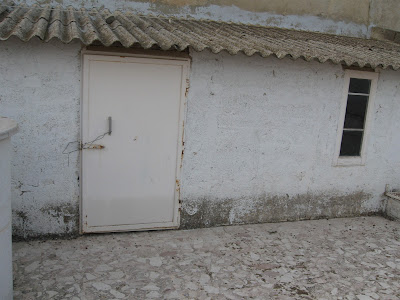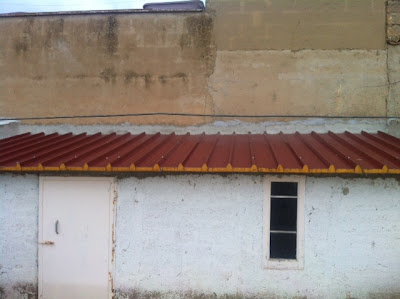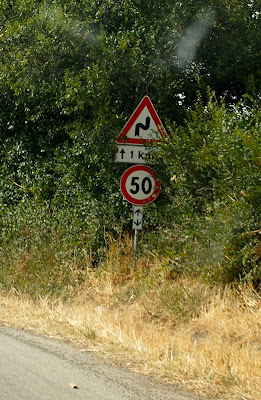“Being Italian is a full time job. We never forget who we are.” Severgnini from
La Bella Figura.
Recently Nick and I watched a Canadian news special about
the sinking of the Costa Concordia and particularly about the actions of the
captain Francesco Schettino. The
Canadian reporter was very critical of Schettino when he arrived at the first
of the hearings. Why was he critical? Because he was wearing an exquisitely
tailored suit, silk shirt, expensive leather shoes, and he had not a single
hair out of place. He was tanned and
smiling for the cameras. I commented on
this to my husband.
“Well, of course he dressed like that. It’s la bella figura!” Nick nodded his agreement. A strict translation of la bella figura is “a
beautiful figure”. A more useful
translation would be “to make a good impression”. While we in North America understand the
concept of making a good impression, and many people would consider it
important, it is not embedded in our cultures here the way it is in Italy. The Canadian news reporter assumed (as many
Canadians would) that his appearance and behaviour indicated a lack of humility
or feeling of responsibility for his actions.
This is completely wrong. His
appearance and way of entering the courtroom would be expected in Italy. It would be completely shameful if he hadn’t
tried to make that impression. Now,
don’t get me wrong, I think his behaviour as captain was appalling and he
should face a trial, but these comments by the Canadian journalist show a real
lack of understanding of the Italian culture and psyche.
Just by happenstance, a few days later I turned on my
favourite Italian cooking show that is broadcast in Canada. The Two Greedy Italians are two rather plump,
very funny Italian gentlemen who travel the length of Italy to find some of the
best traditional Italian food and to explain how it is related to Italian
culture. In this particular episode they
visited a nonna living in Tuscany who talked about how la bella figura is part
and parcel of how she gathers her food and how she feeds her family. Hmmm.
Perhaps there was more to this bella figura thing than I realized.
To make myself better informed on this topic, I started by
reading Beppe Severgnini’s book La Bella Figura: A Field Guide to the Italian Mind. I glimpsed my first explanation of the need
to make a good impression in his words about the airport in Milano: “Malpensa encapsulates
the nation. Only a naïve observer would
mistake this for confusion. Actually
it’s performance art. It is
improvisation by gifted actors. No one
believes for one second that he or she is an extra. Everyone’s a star no matter how modest the
part.” Hmmm. Surely there is more to la bella figura than
this seemingly egocentric view of life?
I began to ask my Italian friends and expats who live in Italy this
question: What does la bella figura mean in your life? I got these answers:
·
“I'm an American who has been living in Milan for about 18 months. I
first interpreted the idea of bella figura to mean that people dressed their
best to make a good impression on others, and I further interpreted it to mean
that I (and my kids) would be judged harshly for not keeping up with trends or
designer labels. I have no interest in those things, and I can't afford them in
any case, so I figured I was doomed to disdain. Now I interpret it more
generously. I take it to mean that each of us has a duty to be our best selves.
For some that will lend itself to ostentatious shows of fabulousness, but for
most of us people (Italian and otherwise) it will just mean "putting in
the effort" to make the best of what you have, be it in terms of how you
dress, how you cook and eat, or the energy and kindness you extend to others.” Expats in Italy
·
“…back in '70s my Uncle Louis, who traveled to Italy often,
pointed out that in Italy and only in Italy, you can spend 10 thousand lire at
a cheap trattoria or 40 thousand lire at an expensive restaurant and you get
the same meal. From the poorest to the richest, they want to make a good
impression with their food.” Expats in Italy
·
In Italy, when we say "bella figura" we are likely to refer to
our behavior, before our looks. "Fai una bella figura" when you have
just done something honest, useful and nice to the others. Or especially, if
you are polite. Banally, years ago we went to a restaurant in Rome, and
the final bill was missing desserts and coffees. We could have shut up about
it, but we felt it was fair to call the waiter and tell him. He was very surprised
and admitted that such a thing would rarely happen. So, that moment we were
making a veeery bella figura of ourselves and (to his eyes) of people from
north Italy. Bella figura is also
showing you have a beautiful house, you can set a table in an elegant way, or
cook in an extraordinary way.” Anita and Irene Bozzetto
·
“…in my opinion the bella figura comes a lot into play also because we
are a small town [Cianciana] and we all know each other and so a lot of people
try to impress each other. I come from a big city so I don't have that kind of
mentality. Plus it's a very outdoor lifestyle and we are strutting our stuff
all over town and so they like to make a big show. Of course, we are
individualistic and like to make a good impression, but in my opinion this is a
good thing (individualism instead of collective) because it values the person -
see the way the sick, elderly etc are treated around town. Anyway, style is in the Italian DNA -
fashion, art, cars, etc . God gives different people and nations different
gifts so that they get together and make the world a better place for all.” Joe Guida
·
“I
not only grew up in an Italian family but spent almost all the summers of my
youth in Italy. I embrace the ideal of la bella figura, and although some
people may interpret this term negatively, I see it as an aspiration of being
your best self. I take pride in my appearance, for me, not for anyone else. I
don't think you have to spend lots of, or any, money to embrace this
notion. I strive to always be gracious to others and bring hostess gifts,
etc.” Expats in Italy






















































